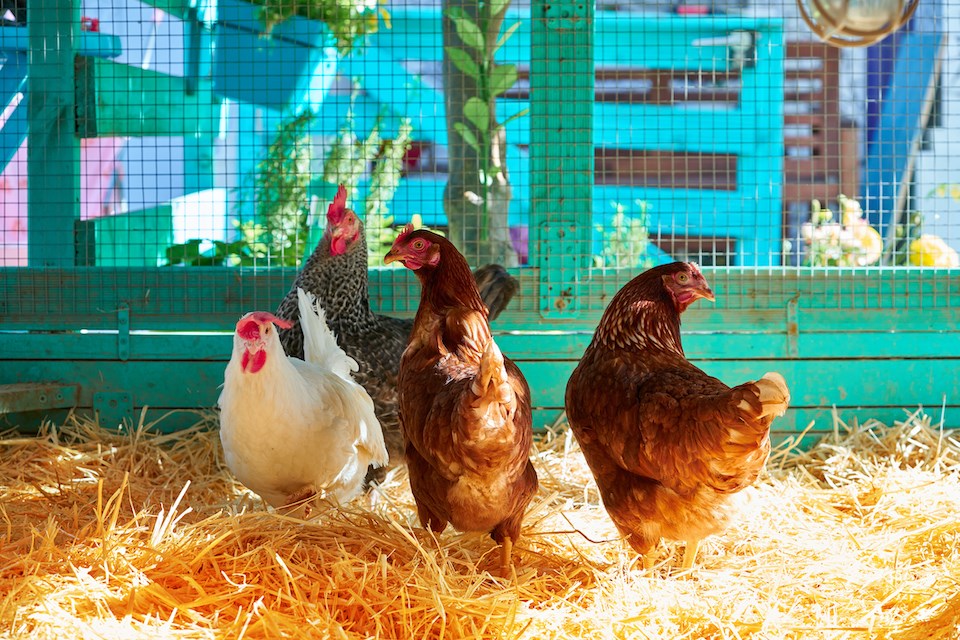Some Vancouver residents can keep chickens in their backyard but they may want to reconsider buying a hen house for now.
The City of Vancouver permits residents to have a maximum of four hens, over the age of four months on a lot (no roosters). Owners must register their hens, get permits, and notify the city if they decide not to keep them.
The Animal Control By-law does not allow residents to keep any other fowl in their backyards. However, a spokesperson for the city tells V.I.A. that it is reviewing the by-law to include more specific details on what bird species may be kept in a backyard coop.
People may also want to carefully consider the risks of handling chicks and wild birds transmitting viruses.
Health Canada confirmed on Nov. 13 that a Richmond teenager tested positive for H5N1 avian influenza, raising concern for the spread of the virus in British Columbia. So far, no other cases have been detected in people.
A spokesperson for the city told V.I.A. that the risk of avian influenza hasn't impacted Vancouver's backyard chicken by-law despite how people may feel now is "a riskier time to keep birds and chickens."
The city has not "issued any warnings nor been informed of any heightened risk by public health authorities" but anyone with a backyard coop should stay up-to-date on the "relevant health and safety guidelines."
What do I need to know about getting a backyard coop?
Having your chicken coop may seem like a great hobby with fresh eggs, free fertilizer for your garden, and a great learning experience for children. However, several important factors need to be considered.
Chickens are a commitment. Like any other pet, they require daily feeding, vet calls, and cleaning. They can live as long as many other household pets, with lifespans over 14 years old.
Maintaining a chicken coop may cost significantly more than having a dog or cat. In addition to the cost of food and bedding, the city notes that coops require regular maintenance and "tools, equipment, heating/cooling appliances, dishes, nets, food storage, scale, fencing, security locks, [and] lighting."
The city recommends hen owners allow at least one hour daily for "cleaning, parasite control, grooming, a physical exam, construction, repair, medication, feeding, [and for supervising] free time out of the pen."
The coop must also be placed in an area that provides adequate shade, direct sunlight, shelter from harsh winds, and allows for adequate drainage.
People who live in high-traffic areas may want to rethink purchasing chickens, as loud noises may frighten the birds.
The city notes that "one chicken is a sad chicken" and owners should consider having at least two. They are flock animals and naturally social.
What are the risks of getting a backyard coop due to avian influenza?
H5N1 is a subtype of avian influenza mostly infecting birds, but sometimes other animals and, in rare cases, people.
The Richmond teenager is Canada's only case of the rare virus but the U.S. Centers for Disease Control (CDC) has confirmed 52 cases south of the border.
According to Health Canada, transmission to humans occurs through:
- close contact with infected domestic or wild animals
- exposure to highly contaminated environments such as animal farms or live animal markets
- exposure to higher risk environments such as backyard or small flocks
The city spokesperson said avian flu is a "real and present risk among the city’s bird and chicken population, and it has been for some time." Hen owners must closely follow Canadian Food Inspection Agency guidelines to minimize the risks of harmful diseases.
Vancouver criminal law lawyer Kyla Lee told V.I.A. people should be cautious about doing anything with birds given the rates of avian flu and the potential legal implications.
"The avian flu risk is high and if you tend to an animal that has the flu, then you catch it or your animal spread it, arguably you could be found liable in negligence," she said.
"I would not want to expose myself to that risk - even if the case would not likely be successful."
What other risks come with having backyard chickens?
Lee noted that hen owners could face legal issues even if they follow the rules.
"This can happen through nuisance claims which can include things other than what is contemplated by the chicken bylaw," she explained.
"Any property owner or tenant has the right to quiet enjoyment of their property. So if a chicken coop, for example, smells so bad that the neighbours' yard smells like chicken feces, a lawsuit could be commenced."
Coops may also attract predators or pests like raccoons and rats that can damage a neighbour's yard or home. These incidents can also lead to legal action.
People must also ensure they want to keep their hens for the long run. If not, they must notify the city and can't slaughter them for meat.
According to the city, backyard slaughtering is not permitted due to health and safety, since doing it at home increases the risk of disease transmission. It also causes a nuisance and could psychologically impact neighbours due to the noise and smell.
The city added that backyard slaughters may not meet the humane standards required for animals, which is a priority for its animal control policies.



